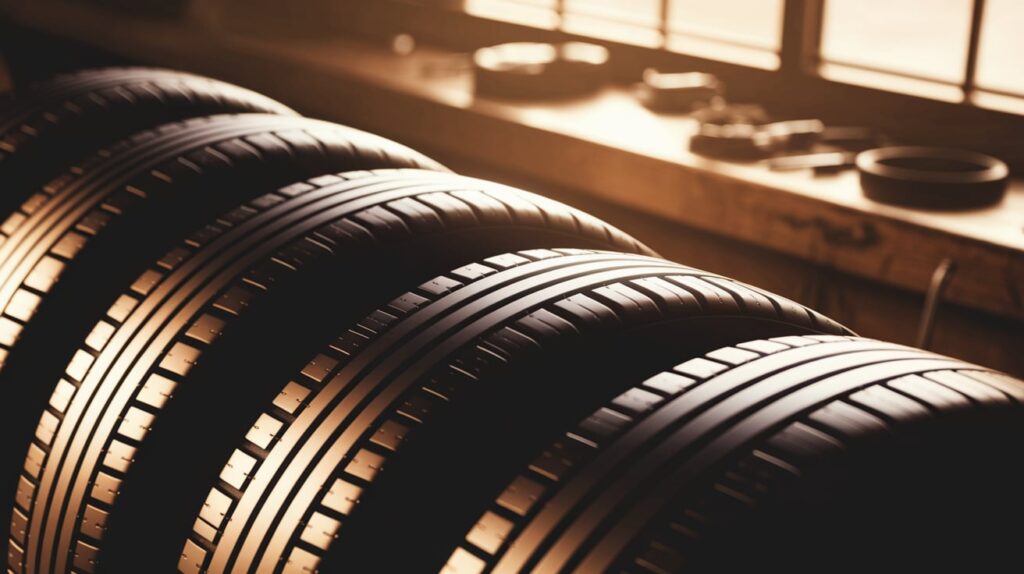SUV tires typically last between 40,000 to 70,000 miles. Their lifespan depends on driving habits, road conditions, and tire maintenance.
Recommended Best SUV Tires 2025
| Recommendation | Product |
| Best Overall | MICHELIN Defender LTX M/S |
| Popular Choice | BFGoodrich All Terrain T/A KO2 |
| Best Value | Falken WILDPEAK A/T3W |
| Best Budget | Cooper Discoverer AT3 4S All-Season |
| Another Excellent Pick | Yokohama Geolander A/T |
Knowing how long SUV tires last helps in planning maintenance and budgeting for replacements. Many factors influence tire longevity. Regular checks ensure optimal performance and safety. Understanding these elements can prevent unexpected tire problems. Whether you’re an adventurous driver or a city commuter, your tires face unique challenges.
Proper care extends their life and enhances driving comfort. In this guide, we explore the factors affecting tire lifespan. We’ll also share tips to maximize their durability. Read on to learn how to make your SUV tires last longer. This knowledge keeps you safe and saves money in the long run.
Suv Tire Lifespan Basics
When you invest in an SUV, you’re not just getting a vehicle; you’re embracing a lifestyle. As you navigate through city streets, off-road adventures, and long highway drives, the tires of your SUV play a crucial role. But how long can you expect them to last? Understanding the basics of SUV tire lifespan is essential for your safety and wallet.
Average Mileage Expectations
SUV tires typically last between 40,000 and 70,000 miles. But this isn’t a one-size-fits-all scenario. The range varies based on the tire type and driving conditions. For instance, all-terrain tires might wear out faster due to their rugged design, while highway tires could offer more mileage due to their smoother tread patterns.
Think about your daily commute. If you’re mostly driving on smooth highways, your tires might reach the higher end of this range. However, frequent trips on rocky terrains may reduce their lifespan. Are your tires nearing the end of their mileage? Knowing this helps in planning replacements and budgeting effectively.
Factors Affecting Longevity
Several factors can impact how long your SUV tires last. Driving habits play a significant role. Aggressive acceleration or sudden stops can wear out tires faster. Keeping a steady pace not only extends tire life but also saves fuel. Consider this next time you’re in a rush.
Road conditions are another key player. Rough roads, potholes, and sharp turns can accelerate wear and tear. Regularly driving on such roads? Inspect your tires more frequently. Additionally, the type of terrain affects longevity. Off-road adventures might be thrilling, but they can be tough on tires.
Maintenance is crucial. Proper inflation and regular rotations can significantly extend tire lifespan. When was the last time you checked your tire pressure? Simple habits like these can save you from unexpected expenses. Moreover, keeping an eye on tread depth and alignment ensures your tires perform optimally.
Reflect on these factors and consider how they apply to your driving routine. Are there adjustments you can make to prolong your SUV tire life? Make informed choices to enjoy safe and cost-effective journeys on the road.
Types Of Suv Tires
Different types of SUV tires influence lifespan, ranging from all-terrain to winter models. Tread depth and driving conditions greatly impact durability. Regular checks and maintenance can extend their life, typically lasting 40,000 to 60,000 miles.
When considering the lifespan of your SUV tires, it’s crucial to understand the different types available. Each type is designed for specific conditions and uses, directly impacting how long they last. Whether you’re navigating the rugged terrains or cruising through city streets, choosing the right tire can make all the difference in durability and performance.
All-terrain Options
All-terrain tires are a popular choice for SUV owners who enjoy mixing on-road comfort with off-road adventures. These tires are built to handle a variety of surfaces, from smooth highways to rocky trails. They offer a balanced performance, allowing you to transition seamlessly between different terrains without changing tires.
However, the durability of all-terrain tires can vary based on usage. Regular off-road driving can wear them down quicker, reducing their overall lifespan. If you frequently drive on rough terrains, consider investing in high-quality all-terrain tires known for their sturdiness.
Seasonal Variants
Seasonal tires are designed to perform optimally in specific weather conditions. Summer tires provide excellent grip and handling on dry and wet roads but aren’t suitable for cold weather. Conversely, winter tires offer superior traction on snow and ice but can wear out faster in warm conditions.
Using the right seasonal tire can significantly extend their lifespan. For instance, swapping out winter tires for summer ones when the weather warms up can prevent unnecessary wear. Are you rotating your tires according to the season? Doing so not only enhances performance but also maximizes their longevity.
Ultimately, understanding the types of SUV tires and their intended use can save you money and ensure your ride is smooth and safe. Whether you’re an off-road enthusiast or a city driver, choosing the right tire type can impact your driving experience and how long your tires will last.
Signs Of Tire Wear
Understanding the signs of tire wear is crucial for safety. Properly assessing your SUV tire’s condition can prevent accidents and costly repairs. Tires do not last forever. Watch for signs that indicate it’s time for a change.
Tread Depth Indicators
Tread depth is a key indicator of tire wear. Tires have tread wear indicators built into them. These indicators appear as bars between the tread. When these bars become flush with the tread, it’s time to replace the tires. A tire’s tread should not fall below 2/32 of an inch. Use a penny test to check tread depth. Insert a penny into the tread with Lincoln’s head facing down. If you see his entire head, the tread is too low.
Sidewall Damage
Sidewall damage is another sign of wear. Look for cuts, cracks, or bulges on the sidewall. Any visible damage weakens the tire structure. These flaws can lead to tire failure. If you notice sidewall damage, replace the tire immediately. Tires with damaged sidewalls can blow out while driving. Regularly inspect your tires for sidewall issues. Keeping an eye out for these signs helps ensure a smooth ride.

Maintenance Tips For Longevity
Maintaining SUV tires well extends their lifespan. Simple practices can help achieve this. Regular care prevents unexpected wear and increases safety. This section covers key maintenance tips.
Regular Rotation Practices
Tires should be rotated every 5,000 to 7,000 miles. This ensures even wear across all tires. Uneven wear leads to reduced tire life. A consistent rotation schedule is essential. Keep track of rotations in a log book.
Proper Inflation Guidelines
Check tire pressure monthly. Use a reliable gauge for accuracy. Refer to the vehicle’s manual for correct pressure levels. Under-inflation leads to increased friction. Over-inflation reduces grip and comfort. Both situations reduce tire lifespan. Adjust pressure as needed.
Impact Of Driving Conditions
Driving conditions greatly affect the lifespan of SUV tires. Different terrains and climates can cause tire wear at varying rates. Understanding these factors helps in maintaining tire durability.
Urban Vs. Rural Roads
Urban roads often have smoother surfaces than rural roads. City driving usually involves more stops and starts. This can lead to faster tire wear. In contrast, rural roads might be rougher and less maintained. Such surfaces can cause uneven tire wear. Regular inspections can help detect early signs of tire damage.
Weather And Climate Effects
Weather conditions play a vital role in tire longevity. In hot climates, tires may wear out quicker. Heat can cause the rubber to degrade. Cold climates can also impact tires. Low temperatures can make them less flexible. Rainy conditions can lead to hydroplaning risks. This can increase the need for frequent tire replacement. Ensuring proper tire pressure in varying climates is essential.
Expert Opinions On Tire Brands
SUV tires typically last between 40,000 to 60,000 miles. Experts suggest regular maintenance extends tire life. Choosing the right brand also impacts longevity.
When deciding how long SUV tires will last, choosing the right tire brand is crucial. Expert opinions on tire brands can guide you to make the best decision. Tire longevity depends not only on driving habits and road conditions but also on the brand’s quality and reputation. So, how do experts view different tire brands when it comes to durability and performance?
Top-rated Brands
Experts often highlight certain tire brands for their reliability and lifespan. Michelin, for instance, is renowned for its exceptional tread life and performance in various conditions. Bridgestone is another brand that frequently earns accolades for its innovative technology and sturdy design.
These brands are recognized for their extensive research and development, ensuring top-tier quality. They’re trusted globally, but does their reputation align with user experiences?
Customer Reviews Analysis
To gain deeper insight, let’s look at what customers say. Reviews show that Michelin users often praise the tires for maintaining grip and stability over thousands of miles. Many drivers confirm that their Michelin tires last longer than expected, even with frequent use.
Bridgestone receives similar applause. Customers appreciate the balance between durability and comfort. However, some note that the price can be higher than other brands. This raises a question: is the upfront cost worth the extended lifespan?
Both brands demonstrate strong performance in customer reviews. Yet, your choice may depend on budget, driving habits, and specific needs. As you read about these brands, consider your priorities. What matters more to you—cost-effectiveness or long-term reliability?
By exploring expert opinions and customer experiences, you can make an informed decision. Remember, the right tire can enhance your driving experience and ensure safety.
Cost Vs. Longevity Considerations
SUV tire longevity depends on factors like driving habits, road conditions, and tire maintenance. Typically, SUV tires last between 40,000 to 60,000 miles. Balancing cost and durability can maximize value and performance. Proper care, such as regular rotation and alignment, extends tire life.
Choosing the right tires for your SUV is not just about picking a brand or style that looks good. It’s a balance between cost and longevity. While budget tires might seem appealing due to their lower upfront costs, premium options often promise longer life and better performance. How do you decide which is best for you? Let’s delve into this decision-making process.
Budget Vs. Premium Options
When you’re standing in the tire aisle, you might feel overwhelmed by the choices. Budget tires can be tempting because they save you money immediately. But do they hold up over time? Premium tires tend to offer better durability, meaning fewer replacements.
Consider a friend who opted for budget tires and found himself replacing them every couple of years. If you’re not keen on frequent tire changes, premium tires might be worth the extra initial investment.
Long-term Value Assessment
Evaluating the long-term value of your tire purchase is crucial. Think about the total cost over the lifespan of the tires. If premium tires last twice as long as budget ones, they could actually save you money over time.
It’s not just about longevity; premium tires often provide better safety and fuel efficiency. You might find your SUV handles better, offering a smoother ride and peace of mind on long trips.
Do you prefer spending a bit more now to save in the long run? Or are you okay with regular replacements at a lower upfront cost? This choice reflects your priorities and driving habits.
The next time you’re in the market for SUV tires, weigh these factors carefully. Your decision will impact not only your wallet but also your driving experience.
When To Replace Your Suv Tires
Tires are crucial for safety and performance. They wear out over time. Knowing when to replace them helps ensure safety. Proper tire care extends their life. Regular checks are important.
Safety Thresholds
Tread depth is a key indicator. Tires should have at least 2/32 inches of tread. Less than this is unsafe. Check tread depth with a penny test. Insert a penny into the tread. If Lincoln’s head is visible, it’s time to replace.
Professional Inspection Tips
Professional inspections provide peace of mind. Experts check for uneven wear. They look for cracks and punctures. Inspections catch hidden problems. It’s wise to get tires inspected annually. A professional can advise on tire replacement.
Frequently Asked Questions
How Many Miles Do Suv Tires Last?
SUV tires typically last between 40,000 to 70,000 miles. Tire life depends on driving habits, road conditions, and maintenance. Regular rotations and proper inflation can extend tire longevity. Always check the manufacturer’s guidelines for specific tire expectations.
How Often Should You Replace Suv Tires?
Replace SUV tires every 6 years or 50,000 miles, whichever comes first. Regularly inspect for tread wear and damage. Check tire pressure monthly for optimal performance and safety. Consult your vehicle’s manual for specific guidelines. Rotate tires every 5,000 to 7,000 miles for even wear.
What Is The Life Expectancy Of Suv Tyres?
SUV tyre life expectancy typically ranges from 40,000 to 70,000 miles. Regular maintenance extends tyre lifespan. Factors like driving habits and road conditions impact durability. Check manufacturer guidelines for specific tyre models. Rotate tyres regularly to ensure even wear and maximize longevity.
Proper inflation and alignment are essential for extending tyre life.
How Long Do Tires Realistically Last?
Tires typically last between 25,000 to 50,000 miles depending on driving habits and road conditions. Regular maintenance like rotation and proper inflation can extend their lifespan. Always check the manufacturer’s guidelines for specific recommendations. Inspect tires regularly for wear and tear to ensure safety.
Conclusion
SUV tires typically last between 30,000 to 60,000 miles. Many factors affect tire life. These include driving habits and road conditions. Regular maintenance extends tire lifespan. Check tire pressure often for safety and efficiency. Rotate tires every 6,000 miles. This ensures even wear.
Inspect tires for damage regularly. Replace them when the tread is worn out. Investing in quality tires can save money long-term. Safe driving practices also help. Remember, well-maintained tires enhance vehicle performance. Prioritize tire care for a smooth and safe ride.








